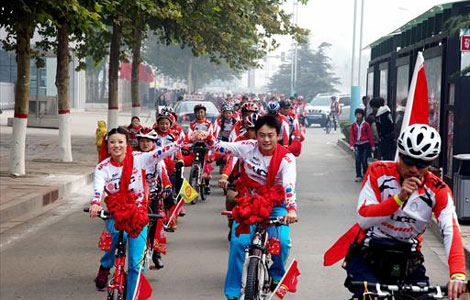Astronaut says future space station a 'villa'
Updated: 2011-10-30 22:08
(Xinhua)
|
|||||||||||
JIUQUAN - "If we liken the return capsule on the spacecraft Shenzhou-5 that took me into space to a one-room apartment, the future space station China is trying to build might be compared to a spacious villa," Chinese astronaut Yang Liwei said Sunday.
Yang, China's first astronaut who was heaved into space in 2003, told Xinhua that the future space station is about 60 tonnes in weight and is able to accommodate six astronauts to work and live inside.
"The space station is much more spacious than the Tiangong-1 space lab module and will provide astronauts with better working environment and platform," said Yang, who is the deputy director of the office of China's manned space program.
China launched to space Tiangong-1, or Heavenly Palace-1, in late September for the country's first-ever space rendezvous and docking with spacecraft Shenzhou-8, expected to blast off in early November at the Jiuquan Satellite Launch Center in the northwestern Gobi desert.
The upcoming docking is considered a key step for China's three-phase manned space program, which aims to build a permanent manned space station around 2020.
Yang said he is fully confident in the building of the space station with the development of China's space program and improvement in space vehicles.
The establishment of the space lab module and the space station will provide more flight opportunities for young astronauts.
The future space station will also enable non-professional astronauts like experts and engineers to join the flight crew, Yang said.
"It won't be too far away for Chinese 'space travelers' to visit the space station aboard a spacecraft," he added.
However, for the first batch of 14 Chinese astronauts, whose average age is 47, some of them might not have the chance to fly into space due to the limited number of manned space flights, though all of them are capable of the missions, the 46-year-old astronaut said.
Yang said it is an irresistible trend to strengthen international cooperation in the field of aerospace development.
"China welcomes astronauts from other countries to participate in our space station and other manned space programs," he said.
Hot Topics
Libya conflict, Gaddafi, Oil spill, Palace Museum scandal, Inflation, Japan's new PM, Trapped miners, Mooncake tax, Weekly photos, Hurricane Irene
Editor's Picks

|

|

|

|

|

|







